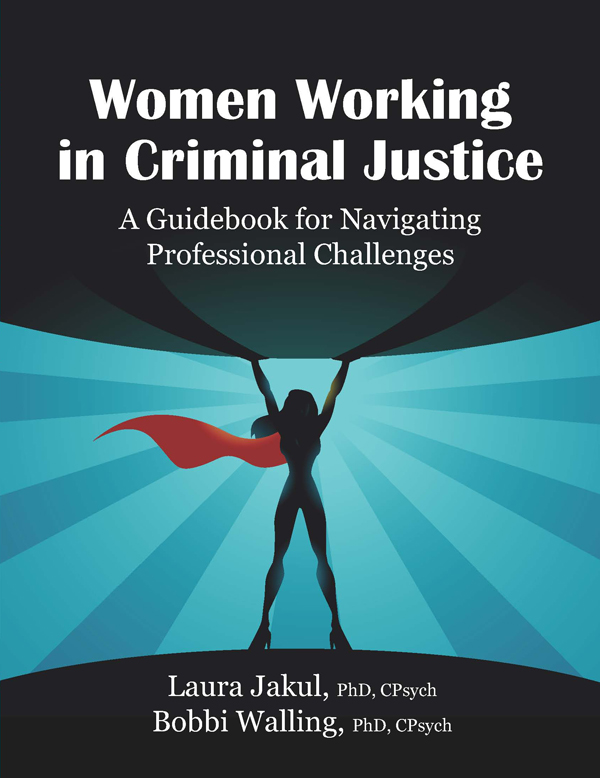Home / Shop / New Products
Women Working In Criminal Justice

- Description
- Specifications
Women Working in Criminal Justice
A Guidebook for Navigating Professional Challenges
by Laura Jakul & Bobbi Walling
With a chapter contributed by Shoshanna Must & Gretchen Sofocleous
Working in criminal justice can be profoundly rewarding yet difficult, especially for women. This dynamic field presents unique challenges due to the intricate gender dynamics that can arise between female professionals and male clients. However, with the right guidance and support, women can thrive and make a lasting impact.
Women Working In Criminal Justice: A Guidebook For Navigating Professional Challenges is a valuable resource for women who are navigating this field or who are considering a career in criminal justice. The authors—Laura Jakul, Ph.D., CPsych, and Bobbi Walling, Ph.D., CPsych, with contributions from Shoshanna Must, Ph.D., and Gretchen Sofocleous, Ph.D.—bring together years of experience in criminal justice systems to offer insights, strategies, and support for female professionals and their colleagues.
Especially Challenging Work for Women

Some of the reasons this work is challenging may be obvious: male clients in criminal justice systems often have traditional views regarding what they consider appropriate work roles for women, and these views and stereotypes may surface as resistance to the therapeutic process, misogynistic attitudes, and frequent boundary testing. Progress toward therapeutic goals can be hampered by sexual thoughts or feelings directed at female therapists.
The authors highlight how subtle issues can crop up unexpectedly, which create challenges therapists may not be prepared to handle. Those issues include:
- Boundary testing: asking personal questions or attempting to extend sessions beyond the agreed-upon duration.
- Misinterpreted social cues: leading to the projection of sexual/romantic motivations.
- Self-regulation deficits: manifesting as both overt and subtle attempts at physical contact.
- Overprotectiveness or patronizing: examples are opening doors or in other ways helping the therapist in order to create a sense of indebtedness.
- Subtle disrespect: not following through on therapeutic tasks, disregarding the therapist's input.
- Pregnancy impact: pregnancy is a visible condition that therapists cannot conceal from clients, which can elicit various emotional responses. Two of the guide’s authors provide strategies for navigating this situation effectively based on first-hand experience.
Therapists are left to navigate the unique and difficult challenge of directly addressing inappropriate behaviors while simultaneously maintaining a positive focus and momentum toward therapeutic goals.
Tools for Navigating These Issues
This guide is extensively researched (over ten pages of references) and contains insights from each author’s personal experience. A variety of tools and strategies are also provided:
- Reflection Exercises: these exercises encourage self-awareness through guided reflection on your experiences and challenges.
- Case Scenarios: provide real-world examples to illustrate common challenges and strategies you can use to address them.
- “Staying Safer Online”: therapists are offered advice on managing their online presence and privacy to maintain professional boundaries and safety.
- Self-Care Strategies: specific strategies and personal skills are key to thriving in this environment.
About the Authors
Laura Jakul, PhD, CPsych, is a registered psychologist practicing in the areas of clinical and forensic psychology at Forensic Psychological Services, a collaborative community-based private practice in Winnipeg, Canada, that specializes in work with individuals in conflict with the law. She completed her clinical residency at the Yale University School of Medicine and earned her Ph.D. from the University of Manitoba. Her forensic experience includes violence risk assessment, treatment for high-risk offenders, evaluations for fitness to stand trial, evaluations for mitigation based on substance abuse in capital murder cases, substance abuse assessment and treatment, and assessment and treatment for developmentally delayed offenders. She has previously provided psychological assessment, consultation, and treatment services in a wide range of hospital, correctional, community mental health, and school settings. Dr. Jakul currently works with adults and adolescents with sexual and aggressive behavior problems, histories of trauma, substance abuse problems, and major mental health issues.
Bobbi Walling, PhD, CPsych, is a registered psychologist with Forensic Psychological Services, a collaborative, community-based private practice in Winnipeg, Canada, that specializes in the assessment and treatment of a high-risk, high-need violent and sexual offender population. Dr. Walling received her Ph.D. in Clinical Psychology from the University of Manitoba in 2012 and completed her clinical residency at the Centre for Addiction and Mental Health (CAMH) in Toronto in 2010. Dr. Walling specializes in the assessment and treatment of youth with sexual and aggressive behavior problems, and consults with families and agencies about managing behaviors of concern. She has provided psychological assessment, treatment, and consultation services for youth and adults in community, hospital and correctional settings. Her clinical experiences include forensic risk assessment and individual and group treatment of high-risk offenders, male Internet offenders, and cognitively impaired men with sexual behavior problems.
Chapter 3 Pregnancy Contributors
Shoshanna Must, PhD, is a forensic psychologist who practices in New York. She received her doctorate from Columbia University and has been specializing in the evaluation and treatment of persons with sexual behavioral problems for more than 10 years. Dr. Must serves as evaluation coordinator and clinician at Empire State Forensics, a private practice that has been awarded contracts from the Office of Mental Health and Federal Probation. She serves on the board of NYSATSA.
Gretchen T. Sofocleous, PhD, received her doctorate from Columbia University and has worked in the field of sexual abuse since 2001. Currently with Empire State Forensics in New York City and Westchester County, NY, Dr. Sofocleous previously held positions collaborating with New York City Criminal Court and Probation and the Federal Bureau of Investigation, as well as the Western Psychiatric Institute and Clinic in Pittsburgh, PA. She has taught graduate courses at Columbia University and New York University.
ISBN: 978-1-940234-09-0
Order #: WP179
Softcover, 8.5" by 11"
150 pages
